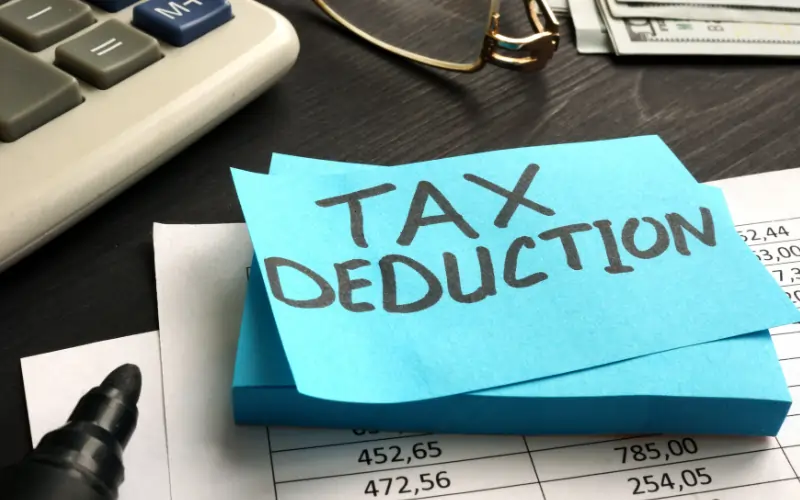
Selling a home involves so many details that it’s hard to keep up. The main things on your mind are probably about making repairs, cleaning, how to sell your place, how long it’s going to take, looking for another house, so more than likely, taxes are an afterthought. But there are some advantages to understanding tax deductions, especially when it comes to selling a home in Ohio, because it could save you thousands of dollars.
This may not be good news to hear, but most Ohio homes in 2025 take about 36-54 days to sell, so you do have some time to learn more about taxes before you make any big decisions. And if you need to sell your house fast in Ohio and save money, well knowing these tax breaks is even more important.
As local cash home buyers, we’ve been helping Ohio homeowners navigate these waters for years. And you’ll want to trust when we say a little tax knowledge does go a long way toward keeping more money in your pocket.
So you may be wondering what Ohio real estate looks like right now. Here’s where things sit currently – home prices jumped 5.6% since last year. The median home price as of July 2025 was $275,600. And as mentioned earlier, homes are selling, but they’re taking about 36+ days to sell on average – up from last year but still not bad.
So why are taxes such a big deal, you might be asking? Most people don’t realize that when you sell your home in Ohio, you might owe capital gains tax on your profits from the sale. Fortunately, there are some ways to reduce or eliminate your tax obligations. However, Ohio doesn’t give any special breaks on capital gains like some other states do. So any profits you make can get taxed just like your ordinary income – something to keep in mind.
Although this might seem scary to hear, it’s really not. We buy houses in Cincinnati and all over Ohio, and we’ve seen how these tax rules play out in real life. Most homeowners, especially those selling their primary residence, end up owing little to nothing thanks to the deductions and exclusions we’re about to walk through.
To explain this better, we’re going to look at the math and numbers behind this, and don’t worry, we’ll keep it super simple. The first thing to explain is what a gain is. When you sell your house, your gain from the sale isn’t what you sold the house for minus what you paid for it. Instead, your starting point is called your cost basis. Think of this as your true investment in the home and would include your original purchase price, plus closing costs like loan origination fees, recording fees, survey fees, settlement fees, and any transfer or stamp taxes you paid when you bought the house.
Here is where things can get interesting because you can also add money you spent on capital improvements over the years. Capital improvements don’t mean fixing a leaky faucet or replacing broken hardware- those are considered repairs. Capital improvements mean home improvements or upgrades that actually make your home more valuable and extend its useful life, like installing central air conditioning, replacing all the windows, and putting in carpeting.
Ok, let’s put all of this together with actual numbers – let’s say you bought a house in Dayton for $180,000 and over the years you spent $25K on improvements and $10K on selling costs when you sold it for $280,000. Your gain would look like this: $280,000 (final sale price) – $10K (selling costs), – $25K (improvements) – $180,000 (original purchase price) = $65,000 – this amount is what you’d potentially owe taxes on.
To calculate these costs correctly, having your sales contract and closing documents from both your purchase and sale is really important for this math equation. As cash home buyers in Huber Heights, we’ve seen how much simpler these tax calculations become for sellers who work with us, since they avoid the maze of traditional closing costs that can complicate their cost basis.

The next step in the process, if you have a gain on your sale, is figuring out what the government’s cut looks like – both federal and state. Fortunately, rates aren’t terrible.
Federally, if you owned your home for more than a year (most people do), you’ll pay long-term capital gains rates rather than ordinary income rates. For most folks, that’s 15%. High earners might be looking at paying 20%, and there’s an extra 3.8% tax for really high incomes.
Now, here’s where the state of Ohio gets interesting. While the federal government gives you better rates on capital gains, Ohio treats them exactly like regular taxable income. So if you’re in Ohio’s 3.5% tax bracket, that’s what you’ll pay on your home sale profits, too.
The capital gains tax on real estate in OH can add up, but remember this is only on your actual profit, and there are ways to reduce or eliminate your tax liability entirely. Many people worry about owing huge amounts, but most end up owing way less than they expect, especially for the sale of your home that qualifies as your primary residence.
After all this talk about taxes and money you might owe, there is some good news to share – you might not owe any taxes at all. This is all thanks to this amazing thing called the primary residence exclusion that can wipe out up to $250,000 of your profit if you’re single, or $500,000 if you’re a married couple filing jointly.
The ownership requirements to get this home sale exclusion aren’t hard to meet, thankfully. You just need to have owned the home for at least two of the past five years, and lived in it as your main home for at least two of those five years leading up to the date of sale. The years don’t even have to be back-to-back.
So, using an example with math – if you bought your Columbus home for $200,000 five years ago and sell it today for $400,000, that’s a $200,000 gain. With the exclusion, you’d owe zero federal taxes and zero Ohio taxes because it covers up to $250,000 in profits. This really is one of the best ways to avoid paying taxes on real estate profits.
The cost of selling a house in Ohio suddenly seems a lot more manageable when you realize you might not owe Uncle Sam anything on the profit.
Like with anything, there are some catches – you can only use this exclusion once every two years, and married couples need to be careful about the requirements. But for most people selling their main home, this exclusion is a game-changer that can completely eliminate their tax obligation.
Ok, so hypothetically speaking, what if you do owe some money on taxes? Well, even if you do owe some tax, you can reduce the tax bill by deducting your selling costs. Selling costs equate to real money, and these expenses are fully tax-deductible and can offset gains significantly.
The biggest deduction is usually real estate agent commissions. In Ohio, you’re looking at roughly 5-6% of your sale price going to agent fees. On a $300,000 house, that’s $15,000-$18,000 you can deduct from your gain. Most people don’t love the idea of paying realtor commissions, especially if they don’t need to deduct that much money.
Other deductions you can claim include: legal fees for handling the transaction, owner’s title insurance, escrow fees, recording fees, transfer taxes, advertising costs if you sold it yourself, and loan assumption fees if the buyer took over your mortgage debt. Don’t forget about mortgage insurance premiums related to the sale either.
Real estate taxes work a little differently. You can’t deduct your whole year’s worth as property tax deductions, but if you paid the full year upfront and the buyer owes from the closing date forward, you can deduct their portion.
If all of these expenses are starting to add up and actually not benefiting you, exploring other selling strategies could be helpful. For example, working with a local cash home buyer like H3 Homebuyers could really pay off. Our home-buying process and how it works are super straightforward. When you work with traditional real estate agents, these costs can eat up a huge chunk of your proceeds during the selling process. We eliminate most of these expenses entirely – no commissions, no lengthy closing costs, no legal fees eating into your profits. That means you keep more of your home’s value while still getting a fair, competitive offer. It’s a smarter way to sell that puts significantly more money back in your pocket.
Fill out the form below or call us at (937) 303-1499 for your FREE cash offer!
Improvements vs repairs can be so confusing for people, and it doesn’t help that the IRS doesn’t make it super clear either. The simplest way to explain it is that repairs just keep your house in good shape, while capital improvements actually make it better, add value, and last longer than the current tax year.
Here are some examples to better understand. You fixed a broken window – that’s a repair – no tax benefit. You replaced all the windows in your house with energy-efficient windows – that’s a capital improvement, and you can add it to your cost basis.
Some clear examples of improvements: installing utility services when you bought the house, adding central air conditioning, putting in new flooring throughout, finishing your basement, adding a bathroom, or building a deck. These home improvements increase your basis and reduce your taxable gain.
The tricky part is that some things fall in a gray area. Replacing a few pieces of broken hardware? Repair. Replacing all the kitchen cabinet hardware as part of a renovation? More than likely an improvement.
We totally get it – with how expensive living expenses are, most of us don’t have extra money sitting around to make costly repairs or improvements before selling. So if you’re in that situation, you’re definitely not alone, and it doesn’t mean you’re stuck with a lower sale price. Also, you can always sell as-is. We buy homes exactly as they are, so you can skip the stress and expense of fixing things up just to sell.
The best thing you can do is keep receipts for everything. Make sure to take before and after photos because the IRS loves documentation, and you’ll love having it if they ever ask questions. Some homeowners even qualify for tax credits under programs like the Inflation Reduction Act for certain energy-efficient improvements.
Most of the information we’ve covered so far is for primary homes, but what do taxes look like when you sell rental properties or investment real estate? Well, that’s where things can get a bit more complicated. Unfortunately, investment properties don’t get that sweet primary residence exclusion we talked about earlier, and you’ll likely face a bigger tax liability.
Plus, if you’ve been claiming depreciation on your rental property (and you should have been), you’ll need to pay some of that back through something called depreciation recapture. It’s taxed at up to 25% federally, which is higher than regular capital gains rates. You can’t offset gains from depreciation recapture with capital losses either.
But you do have the advantage of the 1031 exchange. This lets you sell your investment property and buy another one without paying taxes right away. The clock starts ticking pretty quickly – you have 45 days to find a new property and 180 days to close on it. The timing is strict, but worth it since it can save you a fortune and help you avoid paying taxes on the transaction.
You’ll need a qualified intermediary to handle the money (you can’t touch it), and both properties have to be investment properties. But if you do it right, you can keep building your real estate portfolio without owing a lot of taxes.
For inherited property, there are special rules about the alternate valuation date that can affect your basis calculation, and you might need to file an estate tax return depending on the property’s value.
When it comes to rules and filing, Ohio keeps things relatively simple. There’s no separate capital gains tax form or special calculations. Your capital gains just get added to your regular income, and you pay Ohio’s regular income tax rates on your total taxable income.
For 2025, Ohio has three tax brackets: 0% if you don’t make much, 2.75% for middle incomes, and 3.5% at the top. Your home sale profit gets added with everything else to figure out which bracket you’re in for the tax year.
Ohio does give you some personal exemptions that work better than itemized deductions for most people: $2,350 if your adjusted gross income is $40,000 or less, $2,100 if it’s between $40,001 and $80,000, and $1,850 if you’re above $80,000.
Ohio follows most federal rules, so if you qualify for that big primary residence exclusion federally, you get it in Ohio, too. If you’re trying to figure out how to lower property taxes or just reduce your overall tax burden, understanding these Ohio rules is important.
Although it doesn’t impact your capital gains calculations, you do want to consider how much mortgage interest you have paid over the years and how it affects your overall tax situation.
Here’s what you absolutely need to keep:
For improvements, keep everything:
How long to keep records: Keep all this stuff for at least three years after you file your tax return, though seven years is even better. Scan everything and keep digital copies – you’ll thank yourself later.
When should you call in a tax professional?
Helpful Tip: A good tax expert can be a valuable resource. They can help you understand the rules in simpler language, make sure you’re getting every deduction you deserve, and maybe even suggest timing strategies to save you money. They’ll also know if there are any new tax credits or changes that could benefit your situation.

Looking over taxes and figuring out your tax deductions when selling a home in Ohio isn’t exciting stuff. But understanding them can save you serious money, and that is pretty exciting in our book. Fortunately, between the primary residence exclusion and all the selling costs you can deduct, many Ohio homeowners end up owing little to nothing in taxes.
The key is being smart about it from the beginning. Make sure to keep good records, understand your options, and don’t be afraid to get professional help when you need it.
Here’s the thing, though – all those selling costs we talked about? The commissions, the fees, the headaches? There are ways to avoid most of them entirely. When you contact us today, we’ll show you how our streamlined approach can help you keep more of your money while still getting a fair price for your home.
Because at the end of the day, the best tax strategy is keeping more money in your pocket to begin with.
DISCLAIMER: This article is meant for educational purposes only and is not intended to be construed as financial, tax, or legal advice. H3 Homebuyers always encourages you to reach out to an advisor regarding your own situation.